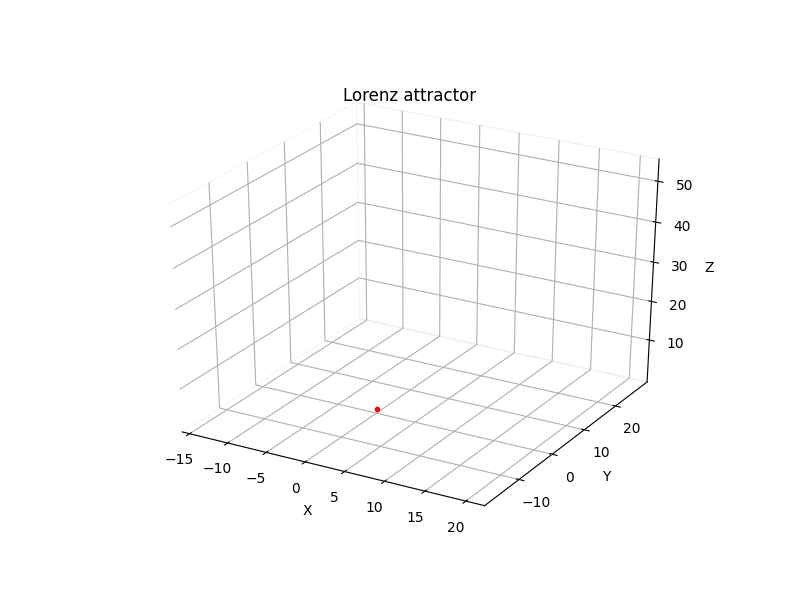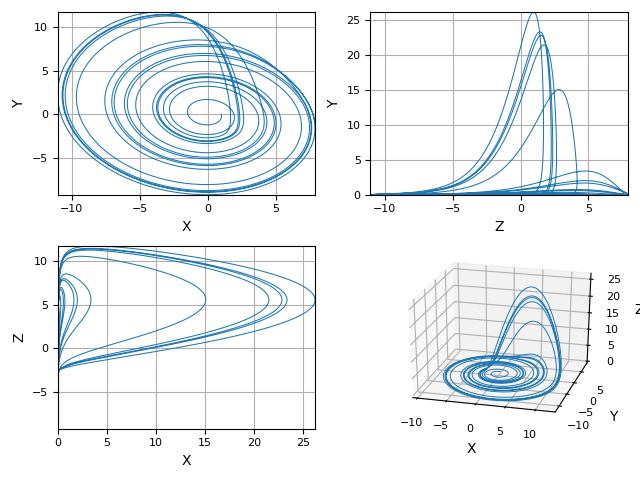Python scripts for some 3rd-order chaotic systems (Lorenz attractor, Nose-Hoover oscillator, Rossler attractor, Riktake model, Duffing map etc.)
Math model:
dx/dt = sigma * (y - x)
dy/dt = rho * x - y - x * z
dz/dt = x * y - beta * zwhere sigma = 10, rho = 28 and beta = 8/3.
| Title | Analysis and modeling chaotic systems |
|---|---|
| Author | Alexander Kapitanov |
| Contact | <email_hidden> |
| Project lang | Python 3 |
| First Release | 30 May 2019 |
| License | GNU GPL 3.0. |
Rossler attractor:
dx/dt = -(y + z)
dy/dt = x + a * y
dz/dt = b + z * (x - c)where a = 0.2, b = 0.2 and c = 5.7.
Spectrum and auto correlation **************** .. image:: https://raw.githubusercontent.com/capitanov/chaospy/master/img/Lorenz_Spectrum.png?sanitize=true
You can check the latest sources with the command:
$ git clone <chaospy.git>
$ cd chaospy
$ <install miniconda for your operation system>
$ conda create -y -n venv python==3.9
$ conda activate venv
$ pip install -r requirements.txtExample run:
$ python run.py --show_plots --show_all lorenzProject requirements: requirements.txt
- Lorenz
- Rossler
- Rikitake
- Duffing
- Nose-Hoover
- Lotka-Volterra
- Wang
- Chua
usage: parser.py [-h] [-p POINTS] [-s STEP]
[--init_point INIT_POINT [INIT_POINT ...]] [--show_plots]
[--save_plots] [--add_2d_gif]
{lorenz,rossler,rikitake,chua,duffing,wang,nose-hoover,lotka-volterra}
...
Specify command line arguments for dynamic system.Calculate some math
parameters and plot some graphs of a given chaotic system.
optional arguments:
-h, --help show this help message and exit
-p POINTS, --points POINTS
Number of points for dymanic system. Default: 1024.
-s STEP, --step STEP Step size for calculating the next coordinates of
chaotic system. Default: 100.
--init_point INIT_POINT [INIT_POINT ...]
Initial point as string of three floats: "X, Y, Z".
--show_plots Show plots of a model. Default: False.
--save_plots Save plots to PNG files. Default: False.
--add_2d_gif Add 2D coordinates to 3D model into GIF. Default:
False.
Chaotic models:
You can select one of the chaotic models:
{lorenz,rossler,rikitake,chua,duffing,wang,nose-hoover,lotka-volterra}
lorenz Lorenz chaotic model
rossler Rossler chaotic model
rikitake Rikitake chaotic model
chua Chua chaotic model
duffing Duffing chaotic model
wang Wang chaotic model
nose-hoover Nose-hoover chaotic model
lotka-volterra Lotka-volterra chaotic modelChaotic attractors are used as subparse command. Example:
usage: parser.py lorenz [-h] [--sigma SIGMA] [--beta BETA] [--rho RHO]
optional arguments:
-h, --help show this help message and exit
Lorenz model arguments:
--sigma SIGMA Lorenz system parameter. Default: 10
--beta BETA Lorenz system parameter. Default: 2.6666
--rho RHO Lorenz system parameter. Default: 28usage: parser.py chua [-h] [--alpha ALPHA] [--beta BETA] [--mu0 MU0]
[--mu1 MU1]
optional arguments:
-h, --help show this help message and exit
Chua model arguments:
--alpha ALPHA Chua system parameter. Default: 0.1
--beta BETA Chua system parameter. Default: 28
--mu0 MU0 Chua system parameter. Default: -1.143
--mu1 MU1 Chua system parameter. Default: -0.714
